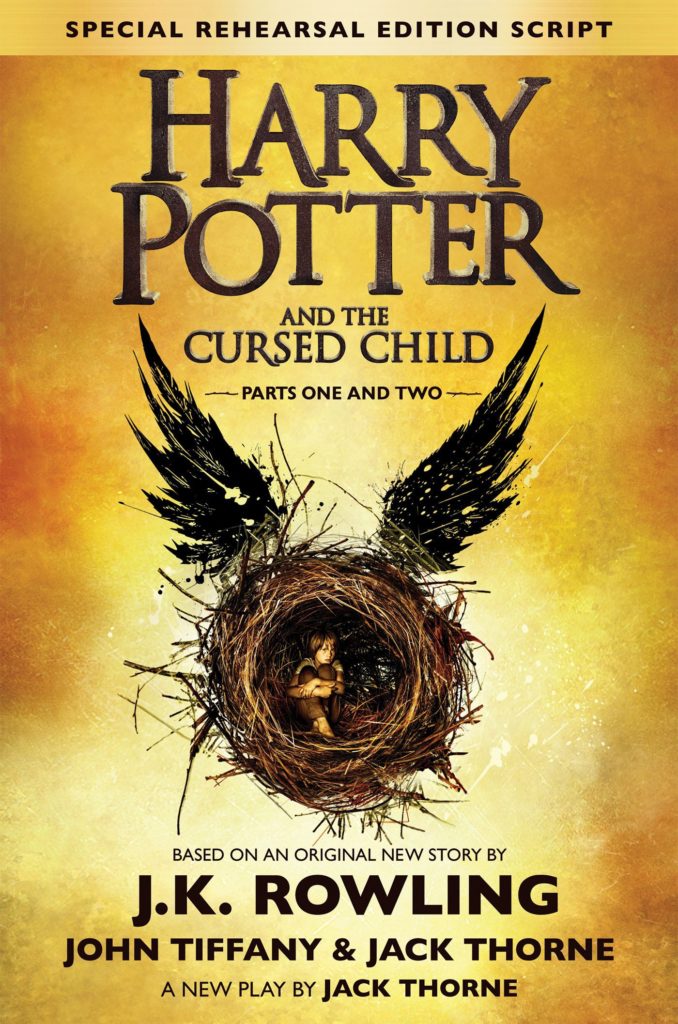
by Jennifer Zhan, senior editor
Like many other die-hard Harry Potter fans, I spent last night celebrating the series with fans of all ages and counting down to midnight. I got my copy of ‘Harry Potter and the Cursed Child’ at 12:05 a.m., which I began reading as soon as I got home. Two hours later, I turned the last page, reeling from new information. I still feel that way all these hours later, but I’ve collected my thoughts enough to write this (spoiler-free!) review.
The play has enough elements of a Harry Potter book — adventure, angst, humor and friendship — to feel familiar. Indeed, every couple of pages, Rowling drops in specific details about old characters’s pasts and what their current jobs are. Each allusion is clearly a gift for devoted fans, but nevertheless, you’re gently reminded that ‘Cursed Child’ has a new set of main characters, each with their own personalities.
Albus Potter’s tense relationship with his father distances the play from the series by bringing in the main, overarching theme of parenting being a complex, imperfect relationship. Rowling didn’t explore the idea much before, but clearly has much to say about it.
I’ll take a moment to address this, because fans are aiming their disappointment most heavily at this point. I understand that a lot of people don’t want to accept a Harry that doesn’t understand his son, considering Harry’s own childhood. It was a little shocking and sad for me, too, but I think it’s important to recognize that even though our heroes have done so much good, that doesn’t mean they get the ending we think they deserve. And is there really such a thing as a perfect parent, anyway? Is it really so hard to believe that Harry could get frustrated, make the wrong choices, and hurt his son’s feelings? I’m actually glad the topic is such a large part of the play, because for me, yes is the unrealistic answer.
In any case, Albus’s struggles at both home and school drive him to inadvertently cause a domino chain of problems. He attempts to fix his blunders with the help of his only friend, Scorpius Malfoy, who is similarly shunned but much less angsty. Scorpius’s scenes with Albus are among the best in the play, and by the end of the first act, this delightfully nerdy kid’s quick wit and earnesty won his spot as my favorite character. (A note for long-time fans: other than Rose Granger-Weasley, who is decidedly unforgettable, the other children from the next generation are excluded from this narrative. This was a bit of a let-down, as I always imagined a next generation story would also include information on Teddy, Victoire, Lily and Hugo.)
The plot is kind of all over the place thanks to time travel. We’ve seen time travel before, but not like this. Changing the past has many implications when the past is the content of seven well-loved books, and fans say this makes the story comparable to a fanfiction. A few events did seem rather contrived. Most notably, I would never have even considered the way the main villain was created even slightly possible. Still, the twists kept me constantly surprised, if a little confused. In the end, maybe ‘Cursed Child’ does read like a fanfiction, but at least it’s a decent one. What’s lacking in the plot is made up for with the sparkling characterization and humor. It’s thought-provoking, as well, and I’d be glad to discuss with someone which character is referred to in the play’s title. As I read, I switched between five different possibilities, and I’m beginning to think the play was deliberately written that way to convey a message.
The only regret I have is that I’ll probably never see the play in London, even if it runs for several more years. Reading the script makes it glaringly obvious that it’s…well, a script. It’s not just the format of the writing that’s different. It’s meant to be heard and seen. Something is inherently lost from a performance when you transfer it to text, even when you copy down all the dialogue and stage directions. In a couple places where dialogue felt odd, I reread lines several times, trying to figure out where a character was emphasizing a sentence and what tone they were taking. Theatre is at its best when performed, and I firmly believe that any parts of the play that felt awkward would be unnoticeable live (not to mention, there must be breathtaking special effects technology being employed to realize all those magical stage directions).
In the end, I think the most important thing is what you expect from this play. I’m among the Harry Potter fans that are rejoicing. I know that almost as many fans are feeling betrayed. They don’t agree with the characterization or the plot, and they don’t want to accept anything. I understand because Harry Potter is so, so important to me, too. But ‘Cursed Child’ wasn’t intended to be treated as the eighth book. While they’re mentioned often, it’s not really about the original Harry Potter characters. It’s a different story of an adventure, perhaps a little far-fetched, but still entertaining. You can get into heated discussions about whether the way the adults are acting makes sense, but when you look at the play with only the series in mind, you miss out on a lot. Being able to reunite with old characters is a gift. I’m thankful for it. But I also cherish getting to meet new characters and dive back into a magical world that is both the same and different.

